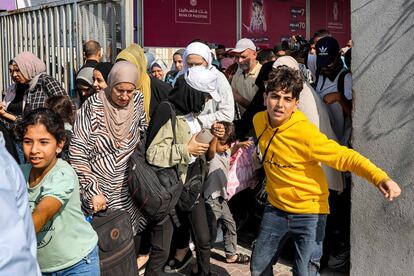Rafah crossing opens to evacuate foreigners and wounded Palestinians from Gaza to Egypt
Some 500 people with foreign passports and 81 seriously injured have received permission to leave the enclave for the first time since the start of the war

After more than three weeks of war, the Rafah border crossing — which connects Gaza and Egypt — opened its doors this Wednesday for some foreign passport holders, including Palestinians with dual nationality, who had been trapped in Gaza due to Israel’s military offensive. Forty Egyptian ambulances also traveled to the site to evacuate seriously injured Palestinians, according to the Egyptian Health Ministry. In total, some 500 people with foreign passports have received permission to cross, according to a list published by the General Authority of Crossings and Borders in Gaza, which includes a worker from Doctors Without Borders and another from a United Nations agency. Permission has also been given to evacuate 81 wounded Palestinians.
The limited opening of the border crossing was possible thanks to an agreement reached between Egypt, Israel and Hamas, with the mediation of Qatar and in coordination with the United States, according to a source cited by Reuters. This same source stressed that the agreement is not connected to any negotiations concerning the more than 200 Israelis held hostage by Hamas or a possible humanitarian ceasefire. What’s more, it remains unclear how many of those allowed to leave are already in Rafah and how many still need to reach the border crossing.
For the past few days, hundreds of foreign passport holders have been staying near the Rafah border crossing in the hopes of obtaining permission to leave Gaza and enter Egypt. Ahmed Salem, director of the Sinai Foundation for Human Rights, explained that those who cross the Rafah crossing are expected to go to Cairo airport to travel to their countries. The list of foreign passport holders who have received permission to leave Gaza includes citizens of Jordan, Australia, Japan, Austria and Bulgaria, as well as workers from U.N. agencies and organizations such as Doctors Without Borders.
It is still not clear what will happen to United States citizens who do not appear on the list: so far, only Americans working for a U.N. agency or NGO have been authorized to leave. Matthew Miller, the spokesperson for the U.S. Department of State, said in a press conference on Monday that U.S. citizens “are being forced to remain in Gaza against their will because Hamas won’t uphold its responsibility to operate its side of the Rafah crossing.” Initially, Cairo said it would only allow foreign nationals to leave Gaza if humanitarian aid was allowed to enter the territory — a process that began in dribs and drabs on October 21.
The first wounded Palestinians to enter Egypt will be transferred to hospitals in three cities in North Sinai province, which is where the Rafah crossing is located, according to the Ministry of Health. In the town of Sheikh Zuweid, nine miles from the crossing, Egyptian authorities have built a field hospital with the capacity to receive about 50 wounded people. According to the Gaza Ministry of Health, the Israeli offensive in Gaza has left more than 21,500 injured, and hospitals in the territory are unable to treat the surge in patients. The health system has also been devastated by the shortage of essential resources and the Israeli airstrikes against medical and health facilities, according to the U.N.
The governor of North Sinai, Mohammed Abdel Fadil Shusha, told a local television station on Tuesday that the injured Palestinians will return to Gaza once they have recovered. Since the beginning of the Israeli military campaign, Cairo has categorically refused to host Gazans forcibly displaced by Israel in the Sinai for security reasons and to avoid participating in a possible ethnic cleansing of Gaza, which would destroy the possibility of a two-state solution.
The decision to allow some wounded and foreign nationals to leave Rafah comes a day after a convoy of 59 trucks with water, food and medicine were allowed to entered Gaza through the same crossing, according to the Palestinian Red Crescent. It was the largest convoy since humanitarian aid shipments to Gaza resumed on October 21, according to the U.N. Office for the Coordination of Humanitarian Affairs (OCHA). As of Tuesday, 217 trucks have been able to enter Gaza. None of them, however, transported fuel despite the serious shortage. Before Israel’s current siege of Gaza, an average of 500 trucks entered the territory every working day, according to OCHA.
Traffic through the Rafah crossing was disrupted after Israel bombed the post three times in less than 24 hours after announcing its total siege on Gaza. These attacks caused significant damage to the Palestinian border terminal.
Sign up for our weekly newsletter to get more English-language news coverage from EL PAÍS USA Edition
Tu suscripción se está usando en otro dispositivo
¿Quieres añadir otro usuario a tu suscripción?
Si continúas leyendo en este dispositivo, no se podrá leer en el otro.
FlechaTu suscripción se está usando en otro dispositivo y solo puedes acceder a EL PAÍS desde un dispositivo a la vez.
Si quieres compartir tu cuenta, cambia tu suscripción a la modalidad Premium, así podrás añadir otro usuario. Cada uno accederá con su propia cuenta de email, lo que os permitirá personalizar vuestra experiencia en EL PAÍS.
¿Tienes una suscripción de empresa? Accede aquí para contratar más cuentas.
En el caso de no saber quién está usando tu cuenta, te recomendamos cambiar tu contraseña aquí.
Si decides continuar compartiendo tu cuenta, este mensaje se mostrará en tu dispositivo y en el de la otra persona que está usando tu cuenta de forma indefinida, afectando a tu experiencia de lectura. Puedes consultar aquí los términos y condiciones de la suscripción digital.









































